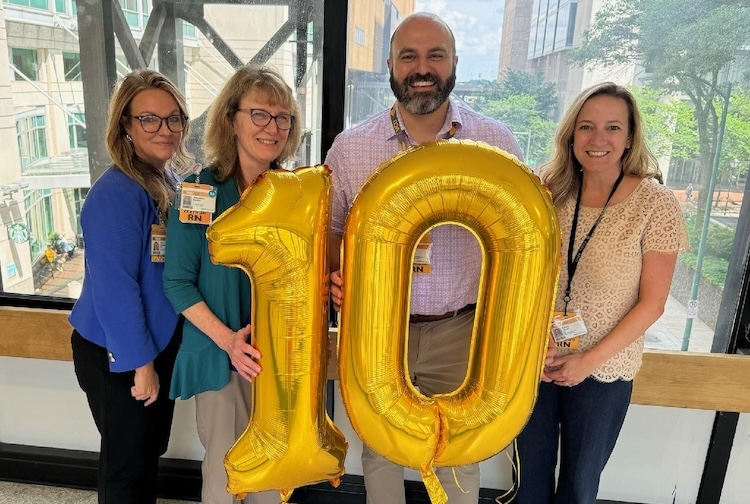Safety ambassadors add a layer of protection and engagement on VCU and VCU Health campuses
The VCU Police unit's members provide services that don't require a sworn officer, and they give visitors a valuable point of contact in times of need.
August 27, 2024 A VCU Safety Ambassador assists a VCU community member on the Monroe Park Campus. (Photo by Kevin Morley, Enterprise Marketing and Communications)
A VCU Safety Ambassador assists a VCU community member on the Monroe Park Campus. (Photo by Kevin Morley, Enterprise Marketing and Communications)
By Corey Byers Standlick
A recent addition to VCU Health's downtown Richmond campus is providing supplemental safety services to community members that do not require a sworn police officer.
Activated in early 2023, the team of unarmed safety ambassadors - including several Virginia Commonwealth University students working part-time - have handled more than 5,800 calls for service on both the academic medical center and Monroe Park campuses, including self-initiated assignments. Calls include mental health checks, assisting drivers with automobile issues, picking up lost property and providing nonemergency transport of patients. They also assist police with staffing major events.
John Venuti, VCU and VCU Health's associate vice president for public safety and chief of police, says the team was developed in alignment with recommendations from VCU's Safety and Well-being Advisory Committee. Its members guided VCU's transition to a new public safety model, which aimed to equitably and more holistically foster the safety and well-being of every individual.
“Ambassadors have been well-received because students and staff know they don't have to speak with a police officer if it's not necessary,” Venuti said. “The team is becoming a national model for alternate types of public safety personnel in higher education.”
Safety ambassadors complete training that includes de-escalation of violence, mental health first aid, crisis intervention, traffic direction, using police radios, and administering CPR and first aid. During most of the school year, they can be seen on either campus between 8 a.m. and 11 p.m., seven days a week.
Brian Sussman, supervisor of the safety ambassador program, oversees training and assignments. He says the team has a unique opportunity to de-escalate potentially volatile situations.
“Safety ambassadors don't wear vests or carry weapons,” he said. “Because they're not armed, it shuts down a potential barrier with students and starts an immediate feeling of trust and understanding.”
Sussman says safety ambassadors work on special events, including police outreach events, which helps bridge the gap between police and community members. Over time, the team's responsibilities have grown.
“From the time we began taking calls, we knew we had to grow and take on as much responsibility as we could when it came to assisting students and supporting police officers,” Sussman said. “Calls for assistance have grown over the last year, and we predict they will continue as we cement ourselves into the safety fabric of the university.”
VCU Police focuses on its deployment of resources and how officers and ambassadors can best serve VCU, VCU Health and the surrounding community, Venuti says.
“Keeping sworn officers available for more serious situations means better response times during critical incidents,” Venuti said. “This model allows us to help anyone needing assistance with minimal delays.”
This summer, the team was highlighted by the Chronicle of Higher Education in a trends snapshot feature, “Expanding Partnerships to Keep Campuses Safe: A Time for Collaboration.” In a spring 2024 safety survey, 80% of respondents reported being aware of safety ambassadors. Additionally, 42% said having the ambassadors increased their feelings of safety.




